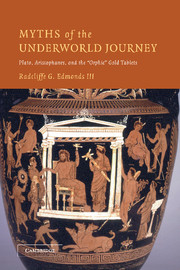Book contents
- Frontmatter
- Contents
- Preface
- 1 Introduction: The Start of the Journey
- 2 Roadmaps of Déviance: The ‘Orphic’ Gold Tablets
- 3 Descent to the Depths of Comedy: The Frogs of Aristophanes
- 4 The Upward Path of Philosophy: The Myth in Plato's Phaedo
- 5 Conclusions: The End of the Road
- Bibliography
- Index Locorum
- Index
1 - Introduction: The Start of the Journey
Published online by Cambridge University Press: 13 October 2009
- Frontmatter
- Contents
- Preface
- 1 Introduction: The Start of the Journey
- 2 Roadmaps of Déviance: The ‘Orphic’ Gold Tablets
- 3 Descent to the Depths of Comedy: The Frogs of Aristophanes
- 4 The Upward Path of Philosophy: The Myth in Plato's Phaedo
- 5 Conclusions: The End of the Road
- Bibliography
- Index Locorum
- Index
Summary
THE START OF THE JOURNEY
So the journey is not as Aeschylus' Telephus describes it: he says it is a simple path that leads to Hades, but to me it seems to be neither simple nor single. For then there would be no need of guides; since no one, surely, could lose the way anywhere, if there were only a single road. But in fact it probably has many forkings and branchings; I speak from the evidence of the rites and observances followed here.
In this passage from Plato's Phaedo, Socrates is making a mythological and philosophical argument, arguing for the immortality of the soul by referring to traditional myths well known to his interlocutors as he prepares to tell his own myth of life after death, the Phaedo's fantastic vision of the many levels of the earth. But Socrates is not merely mentioning a myth well known to his audience; he is contesting it. In place of Aeschylus' myth of a journey to the underworld, Socrates proposes his own different version of the tale and unfolds the details to his interlocutors. Socrates, moreover, with the self-conscious precision characteristic of a Platonic persona, even explains his reasons for contradicting the famous Aeschylus, countering the authority of the great tragedian with his references to the evidence of the rites. I find this passage fascinating because of what it reveals about the way the Greeks handled myth – not as canonical formulations of religious dogma but as a contest of competing authorities vying to provide an explanation.
- Type
- Chapter
- Information
- Myths of the Underworld JourneyPlato, Aristophanes, and the 'Orphic' Gold Tablets, pp. 1 - 28Publisher: Cambridge University PressPrint publication year: 2004



